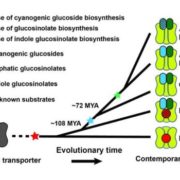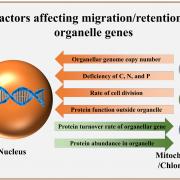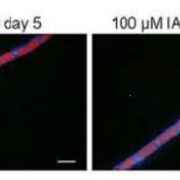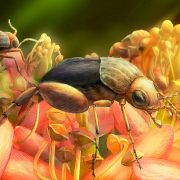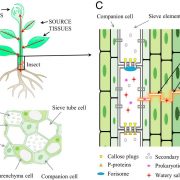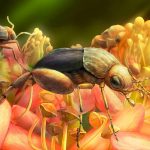Emergence of the Ug99 lineage of the wheat stem rust pathogen through somatic hybridization (Nature Comms)
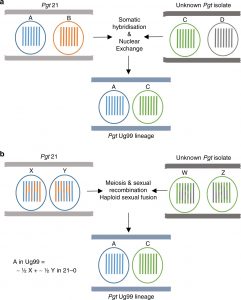 The Ug99 strain of wheat stem rust pathogen Puccinia graminis f. sp. tritici (Pgt) emerged in Uganda in 1999 and presents a significant threat to global wheat production. Genetic analysis indicates it is distinct from other Pgt races. Li et al. set out to understand its origins. Puccinia graminis are dikaryotic fungi meaning they carry two distinct haploid nuclei. In the absence of their alternate host they usually reproduce asexualy, limiting opportunities to increase their genetic diversity. Ug99 carries one haploid nucleus from a known isolate, Pgt21, and another from an unknown donor, and there has been no recombination between these genomes. Thus, Ug99 is derived from the nonsexual process of somatic hybridization. “These findings indicate that nuclear exchange between dikaryotes can generate genetic diversity and facilitate the emergence of new lineages in asexual fungal populations.” (Summary by Mary Williams) Nature Comms. 10.1038/s41467-019-12927-7
The Ug99 strain of wheat stem rust pathogen Puccinia graminis f. sp. tritici (Pgt) emerged in Uganda in 1999 and presents a significant threat to global wheat production. Genetic analysis indicates it is distinct from other Pgt races. Li et al. set out to understand its origins. Puccinia graminis are dikaryotic fungi meaning they carry two distinct haploid nuclei. In the absence of their alternate host they usually reproduce asexualy, limiting opportunities to increase their genetic diversity. Ug99 carries one haploid nucleus from a known isolate, Pgt21, and another from an unknown donor, and there has been no recombination between these genomes. Thus, Ug99 is derived from the nonsexual process of somatic hybridization. “These findings indicate that nuclear exchange between dikaryotes can generate genetic diversity and facilitate the emergence of new lineages in asexual fungal populations.” (Summary by Mary Williams) Nature Comms. 10.1038/s41467-019-12927-7


